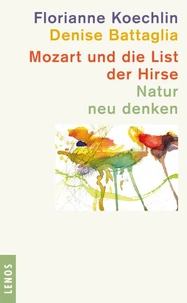Plant whispers. A journey through new realms of science
Par : ,Formats :
Disponible dans votre compte client Decitre ou Furet du Nord dès validation de votre commande. Le format ePub est :
- Compatible avec une lecture sur My Vivlio (smartphone, tablette, ordinateur)
- Compatible avec une lecture sur liseuses Vivlio
- Pour les liseuses autres que Vivlio, vous devez utiliser le logiciel Adobe Digital Edition. Non compatible avec la lecture sur les liseuses Kindle, Remarkable et Sony
 , qui est-ce ?
, qui est-ce ?Notre partenaire de plateforme de lecture numérique où vous retrouverez l'ensemble de vos ebooks gratuitement
Pour en savoir plus sur nos ebooks, consultez notre aide en ligne ici
- Nombre de pages104
- FormatePub
- ISBN978-3-85787-939-5
- EAN9783857879395
- Date de parution23/10/2015
- Protection num.Digital Watermarking
- Taille5 Mo
- Infos supplémentairesepub
- ÉditeurLenos Verlag
Résumé
Plants are not passive, senseless objects. They use the language of fragrances to communicate above and below ground and engage in lively relationships with their environment and peers. Not only do they support relatives, harass strangers, make alliances, they also learn from experience, and remember past events. Some researchers think they are intelligent. And underground they form extensive root and fungal networks to exchange nutrients and information - an Internet of plant communities of unimaginable size.
But what are the consequences of these new insights on plants? What does this mean for agriculture, now facing enormous challenges?
And is it not time to rethink how we relate to plants? The question is if not also plants deserve respect, dignity - and even rights.
Plants are not passive, senseless objects. They use the language of fragrances to communicate above and below ground and engage in lively relationships with their environment and peers. Not only do they support relatives, harass strangers, make alliances, they also learn from experience, and remember past events. Some researchers think they are intelligent. And underground they form extensive root and fungal networks to exchange nutrients and information - an Internet of plant communities of unimaginable size.
But what are the consequences of these new insights on plants? What does this mean for agriculture, now facing enormous challenges?
And is it not time to rethink how we relate to plants? The question is if not also plants deserve respect, dignity - and even rights.




